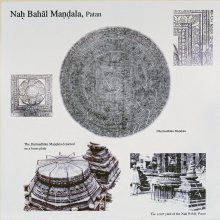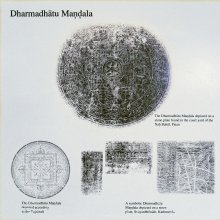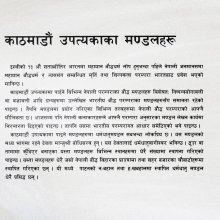Nah, Naḥ: 9 definitions
Introduction:
Nah means something in Hinduism, Sanskrit. If you want to know the exact meaning, history, etymology or English translation of this term then check out the descriptions on this page. Add your comment or reference to a book if you want to contribute to this summary article.
Images (photo gallery)
In Hinduism
General definition (in Hinduism)
Source: WikiPedia: HinduismNaḥ (skt.) is equivalent to asmākam "our, of us."
Languages of India and abroad
Sanskrit dictionary
Source: DDSA: The practical Sanskrit-English dictionaryNah (नह्).—4 U. (nahyati-te, naddha; desid. ninatsati-te)
1) To tie, bind, bind on or round or together, gird, round; शैलेयनद्धानि शिलातलानि (śaileyanaddhāni śilātalāni) Kumārasambhava 1.56; R.4.57;16.41.
2) To put on (oneself), to dress, arm oneself (Ātm.) -Caus. To cause to put on. -With अप (apa) to untie.
-api (api being often changed to pi)
1) to fasten, grid round, bind; अतिपिनद्धेन वल्कलेन (atipinaddhena valkalena) Ś.1; मन्दारमाला हरिणा पिनद्धा (mandāramālā hariṇā pinaddhā) Ś.7.2.
2) to put on, wear; कवचं पिनह्य (kavacaṃ pinahya) Bhaṭṭikāvya 3.47.
3) to cover, envelop; कुसुममिव पिनद्धं पाण्डुपत्रोदरेण (kusumamiva pinaddhaṃ pāṇḍupatrodareṇa) Ś.1.19.
Source: Cologne Digital Sanskrit Dictionaries: Shabda-Sagara Sanskrit-English DictionaryṆah (णह्).—[ṇaha] r. 4th cl. (au) aunaha (nahyati nahyate) To bind, to tie. With sam prefixed, (sannāhati) To arm, to put on mail or military accoutrements. divā-ubha-saka-aniṭ .
--- OR ---
Nah (नह्).—[(-au) aunaha] r. 4th cl. (nahyati-te) To bind: see ṇaha .
Source: Cologne Digital Sanskrit Dictionaries: Benfey Sanskrit-English DictionaryNah (नह्).— (for original nadh), i. 4, [Parasmaipada.], [Ātmanepada.] (also i. 1 or 6, Mahābhārata 1, 1460), 1. To bind, [Bhāgavata-Purāṇa, (ed. Burnouf.)] 5, 14, 38. 2. [Ātmanepada.] To arm one’s self, Mahābhārata 4, 1016. Ptcple. of the pf. pass. naddha 1. Tied, [Rāmāyaṇa] 4, 12, 19. 2. Bound, [Rāmāyaṇa] 5, 14, 15. 3. Covered, [Harivaṃśa, (ed. Calc.)] 8799. 4. Joined, [Rāmāyaṇa] 4, 13, 13. 5. Laid in, Mahābhārata 2, 1915.
— With the prep. apa apa To untie, Mahābhārata 3, 13309.
— With api api or pi pi 1. To fasten, Mahābhārata 4, 301; 13, 2352. 2. To squeeze, [Śākuntala, (ed. Böhtlingk.)] [distich] 18. 3. To cover, [Rāmāyaṇa] 5, 18, 4. pinaddha Striped, Mahābhārata 13, 976 (indrāyudhapinaddhāṅga of which the body was adorned by a rainbow, viz. a cloud).
— With ava ava, avanaddha Covered, [Mānavadharmaśāstra] 6, 76.
— With ā ā [Ātmanepada.] To be obstructed, [Suśruta] 2, 369, 10. ānaddha 1. Bound, Mahābhārata 6, 5525. 2. Obstructed, [Suśruta] 2, 373, 21 3. Covered, 1, 22, 3.
— With vyā vi-ā, vyānaddha Striped (cf. api), Hariv, 6884.
— With ud ud 1. To press out, [Suśruta] 1, 301, 9. 2. To come out, Mahābhārata 3, 11016 (p. 570). unnaddha 1. Bound upward, [Raghuvaṃśa, (ed. Stenzler.)] 18, 50. 2. Raised, [Bhāgavata-Purāṇa, (ed. Burnouf.)] 4, 11, 4. 3. Unfettered, 4, 27, 4. 4. Proud, 4, 14, 4. 5. Arrogant, 7, 10, 26.
— With samud sam-ud, samunnaddha 1. Unfettered, [Bhāgavata-Purāṇa, (ed. Burnouf.)] 4, 17, 33. 2. Pressed out, [Suśruta] 1, 280, 20. 3. Excessive, [Bhāgavata-Purāṇa, (ed. Burnouf.)] 1, 15, 3. 4. Conceited, Mahābhārata 5, 1000. Comp. A- adj. modest, 5, 1010.
— With upa upa, upanaddha Laid in, [Bhāgavata-Purāṇa, (ed. Burnouf.)] 8, 15, 6. [Causal.] To cause to be dressed (as a wound), [Suśruta] 2, 109, 18.
— With pari pari ṇah ṇah 1. To span, Mahābhārata 1, 1406. 2. To surround, [Ṛtusaṃhāra] 6, 25. pariṇaddha Large, [Raghuvaṃśa, (ed. Stenzler.)] 3, 34.
— With pi pi see api.
— With sam sam 1. To fasten, [Bhāgavata-Purāṇa, (ed. Burnouf.)] 8, 12, 21. 2. To dress, Mahābhārata 4, 1220. 3. To put on, Mahābhārata 218, 7; 3, 14958. 4. To prepare for, [Bhartṛhari, (ed. Bohlen.)] 2, 6. saṃnaddha 1. Tied together, [Rājataraṅgiṇī] 4, 543. 2. Fastened, Mahābhārata 15, 627. 3. Bordering, [Rāmāyaṇa] 1, 38, 21. 4. Armed, Mahābhārata 2, 2463. 5. Accoutred, [Harivaṃśa, (ed. Calc.)] 6402. 6. Ready, [Rājataraṅgiṇī] 1, 77.
— With abhisam abhi -sam, abhisaṃnaddha Armed, Mahābhārata 3, 14883.
— Cf. [Latin] nexus, nectere, nere, [Old High German.] nāhan, nāwan; [Gothic.] nêthla; [Anglo-Saxon.] naedl; [Gothic.] nehv, nehva, nehvis; A. S. neah. nearra, neahst.
Source: Cologne Digital Sanskrit Dictionaries: Cappeller Sanskrit-English DictionaryNah (नह्).—nahyati (nahati), [participle] naddha (q.v.) tie, bind on; [Middle] put on, [especially] armour, arm one’s self. [Causative] nāhayati cause to tie together.
Source: Cologne Digital Sanskrit Dictionaries: Monier-Williams Sanskrit-English Dictionary1) Nah (नह्):—1. nah [class] 4. [Ātmanepada] [Parasmaipada] ([Dhātupāṭha xxvi, 57]) nahyati, te ([Potential] -nahet, [Mahābhārata]; nahyur, [Aitareya-brāhmaṇa]; p. [Ātmanepada] nahyamāna [also with pass. meaning] [Ṛg-veda] etc.; [perfect tense] nanāha, nehe; [future] natsyati, naddhā, [Siddhānta-kaumudī] cf. [Pāṇini 8-2, 34]; [Aorist], anātsīt, [Bhaṭṭi-kāvya]; anaddha, [Vopadeva]; [indeclinable participle] naddhvā [grammar]; -nahya, [Brāhmaṇa] etc.; [infinitive mood] -naddhum, [Kāvya literature])
—to bind, tie, fasten, bind on or round or together;
— ([Ātmanepada]) to put on (as armour etc.), arm one’s self, [Ṛg-veda] etc. etc.:—[Passive voice] nahyate, p. hyamāna (See above) :—[Causal] nāhayati ([Aorist] anīnahat [grammar]) to cause to bind together, [Bhaviṣya-purāṇa, khaṇḍa 1 & 2: bhaviṣya-purāṇa & bhaviṣyottara-purāṇa] :—[Desiderative] ninatsati, te [grammar]:—[Intensive] nānahyate, nānaddhi, [ib.]
2) [Prob. for nagh; cf. [Latin] nectere, [German] Nestel (?).]
3) 2. nah (only in nadbihyas, [Ṛg-veda x, 60, 6]; but cf. akṣā-nah) a bond, tie.
Source: Cologne Digital Sanskrit Dictionaries: Yates Sanskrit-English DictionaryṆah (णह्):—(ña, au) nahyati, te 4. c. To bind or tie. With saṃ to put on armour.
[Sanskrit to German]
Sanskrit, also spelled संस्कृतम् (saṃskṛtam), is an ancient language of India commonly seen as the grandmother of the Indo-European language family (even English!). Closely allied with Prakrit and Pali, Sanskrit is more exhaustive in both grammar and terms and has the most extensive collection of literature in the world, greatly surpassing its sister-languages Greek and Latin.
See also (Relevant definitions)
Starts with (+100): Naha, Naha-eboshi-gusa, Naha-kanoko-so, Nahaba, Nahabi, Nahada, Nahadanem, Nahak, Nahaka, Nahala, Nahalai, Nahalana, Nahalavana, Nahalu, Nahalya, Naham, Nahamin, Nahamsi, Nahana, Nahanacunna.
Ends with (+104): Aah, Abdarkhanah, Abhayagiri Vasinah, Abhinah, Abhisamnah, Ajakarnah, Ajaparnah, Akshanah, Anah, Anarthantaravacinah, Angsanah, Anjanabhyanjanah, Apanah, Apinah, Ara tanah, Arjunah, Asanah, Asmarignah, Asvakarnah, Avanah.
Full-text (+2114): Naddha, Naha, Samunnaddha, Upanah, Paryanah, Parinaha, Apinaddha, Malana, Bahusvana, Adbhutasvana, Parinah, Unnah, Shrighana, Aghanashana, Alina, Asmana, Upanaha, Haimana, Priyadarshana, Adhina.
Relevant text
Search found 97 books and stories containing Nah, Naḥ, Ṇah; (plurals include: Nahs, Naḥs, Ṇahs). You can also click to the full overview containing English textual excerpts. Below are direct links for the most relevant articles:
Om Bhadraṃ Karṇebhiḥ Śṛṇuyāma Sevāḥ
Garga Samhita (English) (by Danavir Goswami)
Verse 5.17.19 < [Chapter 17 - The Gopis Describe Their Remembrance of Sri Krsna]
Verse 5.13.32 < [Chapter 13 - The Arrival of Sri Uddhava]
Verse 5.16.22 < [Chapter 16 - Comforting Sri Radha and the Gopis]
Rig Veda (translation and commentary) (by H. H. Wilson)
Gayatri Mantra < [July – September, 2004]
Gaayathree Manthram < [April – June, 2001]
Sakti in the Veda < [July-September 1942]
Soma in Vedic Mythology and Ritual (study) (by Anjana Chakraborty)
Women in the Atharva-veda Samhita (by Pranab Jyoti Kalita)
22. Goddess Sītā < [Chapter 4 - Female Deities and the Glorification of Women in the Atharvaveda]
17. Goddess Pṛśni < [Chapter 4 - Female Deities and the Glorification of Women in the Atharvaveda]
18. Goddess Pṛthivī < [Chapter 4 - Female Deities and the Glorification of Women in the Atharvaveda]


